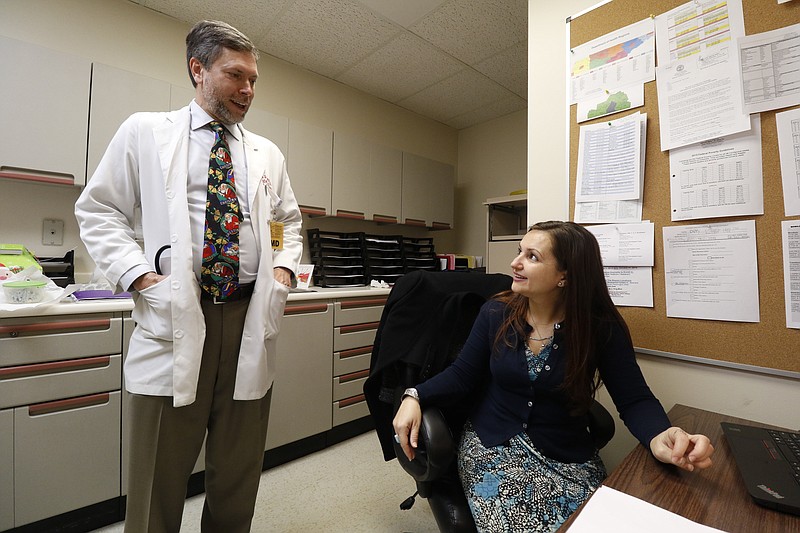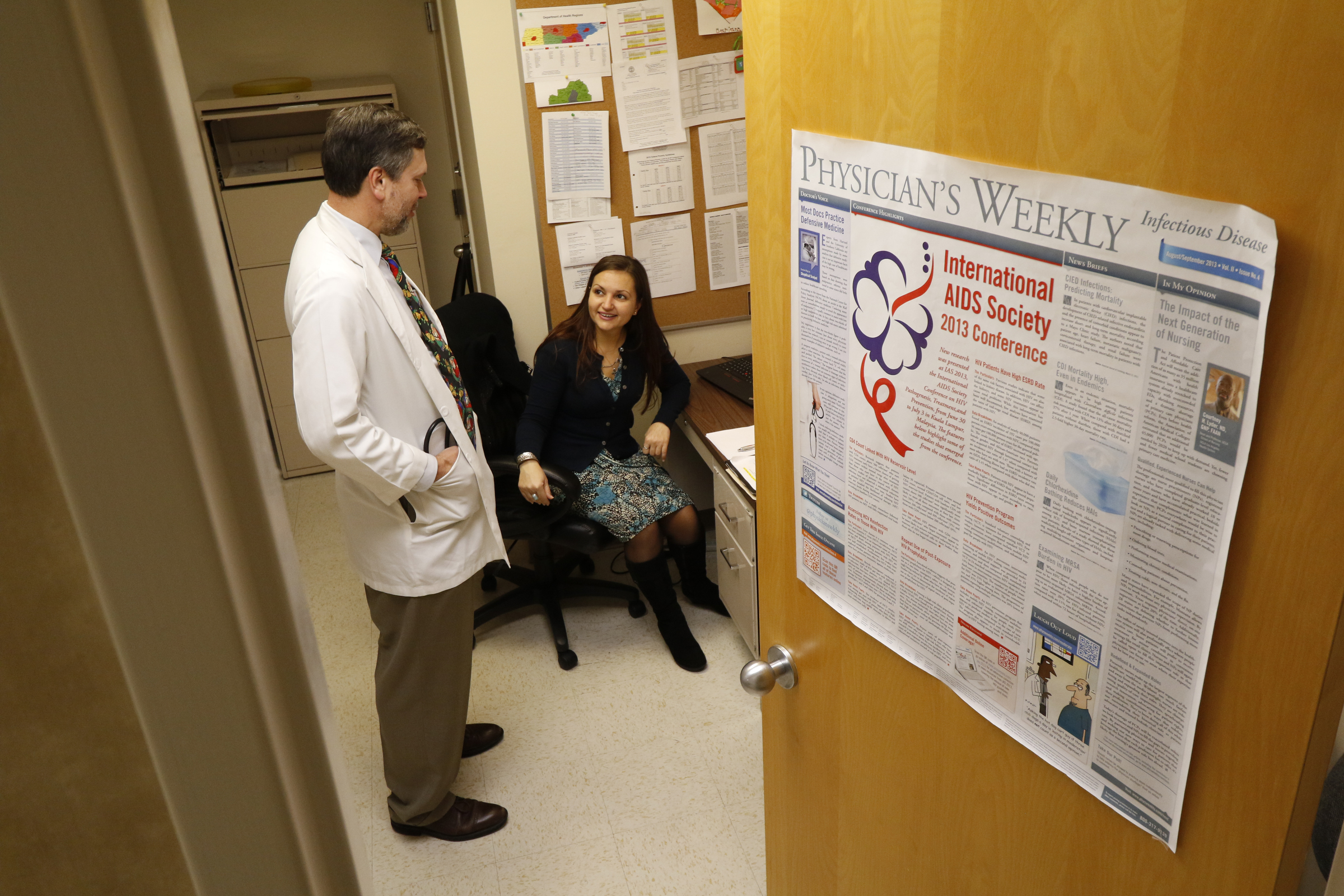"We've realized that if we could get everybody on treatment, we could stop the epidemic," Anderson said. "We would be left with millions infected with the virus, but we have the possibility now of stopping the transmission of HIV in the U.S."
By the numbers
*36 million deaths since first identified*1.2 million deaths in 2014*37 million people now living with HIV*1,000 people living with HIV in Chattanooga metro areaSources: U.S. Centers for Disease Control and Prevention, local doctors
When Dr. Mark Anderson started work as a young physician dealing with HIV patients in 1982, an AIDS diagnosis was a death sentence.
"Over two or three years, I saw people die on a regular basis and had nothing to stop it," Anderson said, sitting in an office at Infectious Disease Physicians, just across the street from CHI Memorial Hospital. "Then we had medication, starting in 1987, but we continued to watch people deteriorate and die."
In the past 35 years, researchers have learned that a combination of several powerful drugs can suppress the HIV virus until it is undetectable. Now those who carry the virus can look forward to a life expectancy not much shorter than those who don't.
"It's the most gratifying thing in my whole life," Anderson said. "There were people on the brink of the grave, and we were able to pull them back."
So why, with today's advances, are people still being infected - and dying?
"Twenty-five percent of the people who have it don't know they have it or haven't been tested," Anderson said. "And then a lot of people who do have it are not in care; they're living in poverty, and they want to ignore it. Those two groups, they're the ones who are transmitting the infections still."
The virus "has always aimed more at those on the fringes of society," said Dr. Jay Sizemore, medical director for Chattanooga CARES, the other major HIV treatment center in Chattanooga. He and Anderson and the five other doctors in their two practices now handle all of the 1,100 HIV cases in Chattanooga and adjacent counties.
Instead of treating their illness, too many of those infected have other concerns, Sizemore said.
"Do they have a roof over their head, a meal for their kids, or are they out stealing at Wal-Mart, getting thrown in and out of jail because they are out stealing money for drugs?" he said.
Many of those who carry the virus have mental health issues as well, Anderson said.
"That causes them to become homeless, to lose their jobs," he said. "They have depression and that can cycle into deeper depression where they don't want to deal with anything anymore, and just stop taking medication."
"We all do a terrible job taking medication," Anderson said. "But people living in poverty or who are disconnected [from] the system, they do worst, the worst of anyone. That's the population HIV is growing the fastest in, and it is increasingly focused on the Southeast."
So for Anderson, Sizemore and other doctors treating HIV, the focus has shifted from treating HIV medically to treating it socially.
"We've got the tools to be successful," Sizemore said. "It's the testing, the outreach, the social service piece of it that remains critical for us to be successful."
"We've realized that if we could get everybody on treatment, we could stop the epidemic," Anderson said. "We would be left with millions infected with the virus, but we have the possibility now of stopping the transmission of HIV in the U.S."
A step at a time
A shift is occurring nationwide - how to identify those with HIV, how to get them into treatment and then how to keep them there.
Primary care doctors are being urged to test patients they might not think have HIV.
"In the first two decades of treating HIV, we focused on high-risk groups," Sizemore said. "Now we're focusing on everybody."
Once the infection is detected, the next challenge is getting those who are HIV-positive to a treatment center. They may have no health insurance or transportation, or may believe they can't afford the treatment. Increasingly, doctors treating HIV patients are turning to case managers to help with those issues.
Tennessee has created Centers of Excellence in treating AIDS to guarantee that patients will get the best care. Chattanooga CARES has had that designation for some time, but Anderson's practice just received it recently. He has used the funding to hire a case manager, Tania Mull, for the approximately 400 local AIDS patients he and his two partners see on a regular basis.
Her job is to solve problems, most of them financial.
"I'm looking for assistance programs for our patients to access all of these health services without worrying about having to pay all of their income on medication," she said. The money is often available, she said, but patients need help to figure out how to find it.
Chattanooga CARES has a nutritionist on staff, mental health counselors, and a peer program where patients whose HIV is under control can share their experiences with others.
"I can't step into their shoes because I'm not living with HIV," Sizemore said. "These folks can step in their shoes, explain, 'Here's how I've done it.'"
No one believes HIV will be eradicated anytime soon. The rate of new infections across the U.S. has remained steady at about 50,000 per year.
"Everybody in this field can express the same frustration," Mull said. "You want to help somebody and they are not following the regimen prescribed for them."
If doctors could directly observe every patient's therapy, "this epidemic would end," Sizemore said.
That is unlikely to happen, but at least now there are successes to balance out the frustrations.
"It's still the greatest thrill to get someone back from the brink," Sizemore said. "You get the huge smile, you know you're making a difference - that keeps me going."
Contact staff writer Steve Johnson at sjohnson@timesfreepress.com or at 423-757-6673, on Twitter @stevejohnsonTFP or on Facebook at stevejohn sonTFP.

